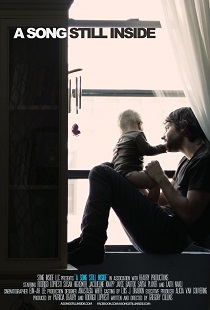 A Song Still Inside starts with a father alone at home with his infant son: the latter’s inconsolable crying piercing through the empty silence of the credits like a crashing explosion of glass. Like any good, attentive parent, Mike (Rodrigo Lopresti) chats playfully with the boy, tries to rock him to sleep, and stops just short of pulling all his own hair out trying to soothe the little bastard. When the kid finally does pass out, Mike not so jokingly tells his unconscious son that once “mom” (Susan Highsmith) gets home, she’ll be on-call, and the child can be as loud and whiny as he wants.
A Song Still Inside starts with a father alone at home with his infant son: the latter’s inconsolable crying piercing through the empty silence of the credits like a crashing explosion of glass. Like any good, attentive parent, Mike (Rodrigo Lopresti) chats playfully with the boy, tries to rock him to sleep, and stops just short of pulling all his own hair out trying to soothe the little bastard. When the kid finally does pass out, Mike not so jokingly tells his unconscious son that once “mom” (Susan Highsmith) gets home, she’ll be on-call, and the child can be as loud and whiny as he wants.
Thus, it takes the audience less than five minutes to figure out just where this marriage is, and how it’s affecting Mike, the movie’s main character. It’s a good start, for director Gregory Collins fills in a healthy chunk of his lead’s back-story in just a handful of minutes, and allows his film to pick up at a crucial point in Mike and his wife Maggie’s relationship. Yet this is the creative high-water mark of the film, and is the only gear in this picture’s transmission that Collins seems interested in exploring.
The story of a young husband and wife’s struggles through the personal and professional speed bumps encountered in most marriages during the early just-had-a-kid years, A Song Still Inside is a fairly predictable and trite little film. Its main conflict centers on the angst Mike experiences as he slogs through the mundane trivialities of a homemaker’s life whilst his spouse reaps all the benefits of a career on the fast-track. The tension is further ratcheted up by the fact that Mike and Maggie share a profession, acting, the practical realities of which have found the always-at-home Mike with far less of a chance to succeed than his still-working wife.
 Yet as interesting (if entirely familiar) a set-up as all of this is, A Song Still Inside does little with it. If the film had started with Mike and Maggie’s courtship, or even the more optimistic days during the latter’s pregnancy, and then moved on to this featured career-conflict in its second act to then resolve it in the third, it might be a complete (and decent) picture. Yet by beginning with the conflict right out of the gate, and sticking with this right up until the last ten minutes of the film, where a hasty and unrealistic ending is lazily tacked on, A Song Still Inside renders itself hollow and toothless.
Yet as interesting (if entirely familiar) a set-up as all of this is, A Song Still Inside does little with it. If the film had started with Mike and Maggie’s courtship, or even the more optimistic days during the latter’s pregnancy, and then moved on to this featured career-conflict in its second act to then resolve it in the third, it might be a complete (and decent) picture. Yet by beginning with the conflict right out of the gate, and sticking with this right up until the last ten minutes of the film, where a hasty and unrealistic ending is lazily tacked on, A Song Still Inside renders itself hollow and toothless.
While Mike’s frustration and resentment regarding his wife’s behavior and disregard for his career certainly make sense, every opportunity he has at expressing this dissatisfaction goes by unclaimed. This gives the conflict of the picture an uneven tone, for while the audience may sympathize with Mike’s plight, they can’t exactly get behind him due to the way he handles himself. Maggie is similarly complex, for while she seems to be a caring, compassionate partner, the woman is clearly taking a selfish line as it concerns the prioritization of her career over Mike’s. And while the movie might be making a deliberate decision with this by showing the complexity of any relationship, and the equal give-and-take necessary on both sides, the end result on-film leaves a very confusing taste in the viewer’s mouth.
 Matters aren’t helped at all by the issues that bring about the sub-conflicts in A Song Still Inside, most of which seem so contrived and unrealistic as to nearly throw a person out of the picture’s reality. Really big deals are made of seemingly small issues, and, again, while this may have been a statement on all the little things that ultimately doom a relationship, the practical realities of the script and what they portend simply don’t add up. A few character points are laid into the script to fill in the gaps the in media res structure skip, like Mike’s non-relationship with his father, yet none of this goes anywhere near explaining why the man can’t express any of his own feelings to Maggie.
Matters aren’t helped at all by the issues that bring about the sub-conflicts in A Song Still Inside, most of which seem so contrived and unrealistic as to nearly throw a person out of the picture’s reality. Really big deals are made of seemingly small issues, and, again, while this may have been a statement on all the little things that ultimately doom a relationship, the practical realities of the script and what they portend simply don’t add up. A few character points are laid into the script to fill in the gaps the in media res structure skip, like Mike’s non-relationship with his father, yet none of this goes anywhere near explaining why the man can’t express any of his own feelings to Maggie.
“I always agree with you,” Mike says at one point. But why? Why didn’t he ever express his own feelings prior to the events in A Song Still Inside? What was so special about this relationship in the first place that makes the threat of its disintegration meaningful? The movie doesn’t answer any of these questions, or propose any good explanations for the events that resolve the one conflict A Song Still Inside offers its audience. Collins seems content to simply tell the story of two people who can’t seem to adequately communicate their needs with each other during a very trying time in any relationship (the first year of the first child’s life). A good starting point, to be sure, yet this is hardly enough to carry the events of an entire picture, and is nowhere near enough to inform a believable ending: something this picture lacks.
An episodic movie, A Song Still Inside makes extensive use of hard cuts to transition between scenes, yet makes poor use of them and does little to build on the initial conflict of Mike’s resentment towards Maggie and her professional success. Minor sub-plots like a questionable mother-in-law and a new screenplay come and go with little effect on the overall events of the movie, which all seems to be building towards a climactic showdown that any audience member could see coming from minute fifteen or so.
Opening today at the Seattle International Film Festival 2013, A Song Still Inside won’t provoke any boos, and certainly shouldn’t offend anybody. The movie’s got a good group of competent actors and slick camera work that brings the modern New York City setting to life, yet wastes much of this on a somewhat familiar plot dressed with conflicts that flirt with words like “ludicrous” and “laughable.”






Comments on this entry are closed.